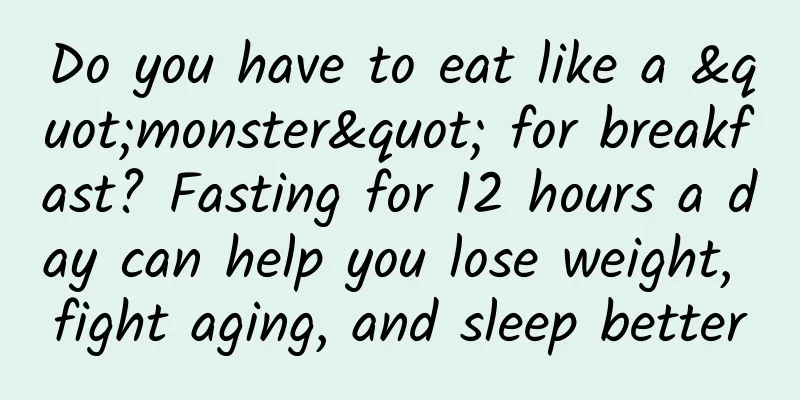Rather than quick weight loss, you need a strategy to prevent weight gain

|
In the experience of helping nearly 2,500 people to lose weight, I found that almost everyone who came to the weight loss clinic for help from a nutritionist had previously used a weight loss method that claimed to be effective quickly, such as: diet control, fasting, exercise, meal replacements, health foods that claimed to reduce body fat production, direct selling health foods, weight loss pills, fat-burning tea, fat pushing, liposuction, weight loss surgery, Chinese herbal medicine, thread embedding acupuncture, etc. These methods usually have one thing in common, which is that they are very effective in the short term, and losing two or three kilograms in a month is a common case. However, after stopping the method for three months, six months or even a year, the weight will definitely come back... Why is this so? Nutritionists have discovered that these so-called quick-acting weight loss methods simply cannot cure "obese behavior"! Scientists have found that in addition to some factors that cause obesity being related to hormonal regulation (such as growth hormone, thyroxine, cortisol, and polycystic ovary), the most important factor is the lack of clear understanding of the correct food choices. People think that they have successfully transformed themselves and that they cannot gain weight with a lean physique, and then gradually lose their vigilance against high-calorie foods, not knowing that they have accidentally stepped on the landmines of high sugar and high oil! Since humans are forgetful animals, it is not easy to completely change the eating habits that have led to obesity over the years. Therefore, the most important technique to avoid gaining weight again is to see a nutritionist regularly, re-examine your lifestyle, strengthen your health beliefs, and persist in the results of the changes, so that you can truly "lose weight and avoid gaining weight again." The most popular weight loss program that aims to change behavior is called a behavioral weight loss program. Behavioral theory has been applied to obesity treatment since 1970 and has gradually matured in the past 30 years. The behavioral weight loss program usually lasts for 18 weeks and is implemented in small groups with about 15-20 participants. It is led by experts in various fields and includes weekly meetings for a total of six weeks. The next 6-12 weeks are meetings every two weeks. The 12-18th week is meetings every two weeks or once a month. The behavioral weight loss program is designed to lose -0.5~1 kg per week. Rapid weight loss is not recommended. In order to achieve this goal, those who weigh less than 90 kg are recommended to consume 1200-1500 calories per day; if they weigh more than 90 kg, they should consume 1500-1800 calories per day. There are no special restrictions on the diet of participants in the behavioral weight loss program, but participants are still encouraged to choose a low-fat and balanced diet as a principle. People who want to lose weight can use records to understand their daily routines, eating habits and diet, and then discuss with experts to develop a short-term, mid-term and long-term weight loss plan that is feasible for them. Diet accounts for 70% of a successful weight loss program, while exercise accounts for 30%. Nutritionist Ziyi will first reveal to you four common behavioral weight loss techniques for preventing weight gain: Tip 1 for not gaining weight again: Regular inspection and measurement By measuring your weight at a fixed time point, you can review whether your previous behavior has deviated and where corrections can be made. This can remind and strengthen your motivation to lose weight and continue to promote behaviors that are conducive to a healthy weight. Tip 2 for not gaining weight again: Successful satiety diet There is actually a little trick to create a feeling of fullness: "drink before eating". You can drink a 500cc glass of cold boiled water before a meal. According to the 2010 Journal of Obesity Medicine, a study conducted by Professor David of the Department of Human Nutrition at Virginia Tech University in the United States showed that under the same low-calorie diet control (about 1500 kcal/day for men and about 1200 kcal/day for women), the experimental group ate low-calorie meals three times a day, but drank 500cc of water 30 minutes before the meals. The chyme in the ileum will send signals to the brain, stimulating the satiety center, naturally producing a sense of fullness and reducing our food intake; the control group only had three meals a day, ate low-calorie meals, and did not drink much water before meals. After 12 weeks of the experiment, the experimental group lost about 2 kilograms more weight than the control group, and the weight loss effect was significantly better than the control group. After drinking the water, eat a natural, unprocessed and balanced diet, choose low-fat, non-fried foods, and chew slowly before eating. Snacks and desserts are not recommended, and each meal should not be more than 80% full. According to the Ministry of Health and Welfare's Healthy Living Manual, not eating three hours before going to bed is the highest principle of a weight loss diet. Tip 3 for not gaining weight again: Accumulated exercise consumption To combat long-term accumulation of stubborn fat, in addition to reducing calorie intake by eating less and trying not to store calorie intake as fat due to excessive calorie intake, you should also increase your daily physical activity to increase fat metabolism. Aim to walk 10,000 steps every day. Don’t stand if you can walk, don’t sit if you can stand, and don’t lie down if you can sit. Take the stairs more often and take the elevator less often, get on and off the bus one stop earlier, take out the trash a few more steps, lift your feet while watching TV, ride a stationary bike, do housework more often, clean the environment more often, walk briskly while listening to your favorite music, exercise for 10 minutes each time, and accumulate at least 30 minutes a day. As long as you hold the idea of "moving no matter what", you will definitely see results! Tip 4 for not gaining weight again: Regular life and work schedule The hormones in the body that increase the basal metabolic rate are thyroid hormone, growth hormone, adrenaline and norepinephrine; other intestinal hormones, such as cholecystokinin, glucagon-like peptide-1 (GLP-1), insulin, pancreatic polypeptide (ppp), amylin, etc. In addition, gastric cells secrete ghrelin, which is also related to appetite regulation. Fat and hormones secreted by the gastrointestinal tract, peripheral nerves and cerebral cortex stimulation and other information can be transported to the brain through the blood circulation. After being interpreted and integrated by the hypothalamic neurons, if the satiety signal is stronger than the hunger signal, it will stimulate the satiety center and reduce food intake. Our body relies on this signal transmission mechanism to regulate body weight. Regular work and rest is the best way to avoid hormonal disorders. Working at sunrise and resting at sunset can increase metabolism and avoid the risk of obesity. References: Ministry of Health and Welfare - Handbook for Healthy Living, Taiwan Obesity Medical Association - Treatment of Obesity This article comes from: Mango Social Enterprise ※For more information, please see "Mango Social Enterprise" |
<<: Such a satisfying dinner! Cooking beef soup in layers will help you stay slim
>>: Don't let time make you old. Strength training is necessary for anti-aging
Recommend
Eating heavy and salty foods can easily cause obesity! Eat more of these two great foods to reduce edema
Are the Buddha Jumps Over the Wall, Dongpo Pork a...
What are the symptoms of cervical erosion in women? Detailed description of different degrees of cervical erosion symptoms
Cervical erosion can be divided into mild cervica...
What to do about irregular menstruation caused by blood deficiency? 6 dietary care methods for irregular menstruation
Many women around me are infertile due to blood d...
Symptoms of ovarian cysts can lead to infertility
Ovarian cysts have harmed the health of many wome...
Getting up at 8 o'clock in the morning and basking in the sun is good for weight loss! A helping hand for a good metabolism
Do you prefer to get up early in the morning and ...
envious! The reason why you can’t gain weight even if you eat a lot is because you have “slim genes”! TABATA campaign to fight obesity
If you eat the wrong tonic food in winter, be car...
Precautions after ectopic pregnancy surgery
Avoid getting pregnant again after ectopic pregna...
What should I do if my period is delayed for 12 days and the amount of menstruation is small?
What should I do if my period is delayed for 12 d...
Do I need to take protein powder to lose weight? Nutritionist: If you want to be thin and full, you should adopt this diet
When it comes to losing weight, a hundred people ...
What are the common questions about uterine myomectomy? Will uterine myomectomy recur after surgery?
At present, the clinical treatment technology of ...
Getting up early and doing 12 yoga moves can help your metabolism and lose weight quickly
Morning exercise is a habit of many people. The a...
How to determine whether it is an ectopic pregnancy?
Expert answer: Ectopic pregnancy, also known as e...
Thread embedding not only helps in body sculpting, but also has these uses. Is it suitable for everyone? A Chinese medicine practitioner answers
Summer is here, and it is the peak season for wei...
Several foods that can assist in the treatment of pelvic inflammatory disease
Patients with pelvic inflammatory disease should ...
Explanation: Causes of pelvic inflammatory disease
There is a gynecological disease called pelvic in...









